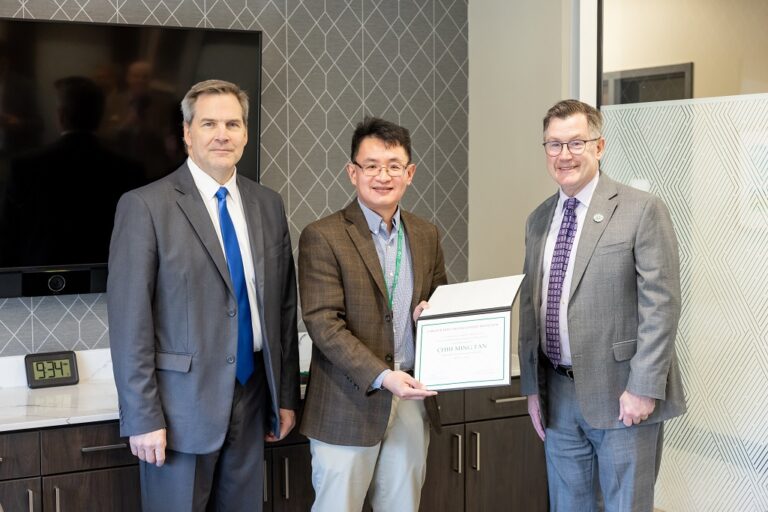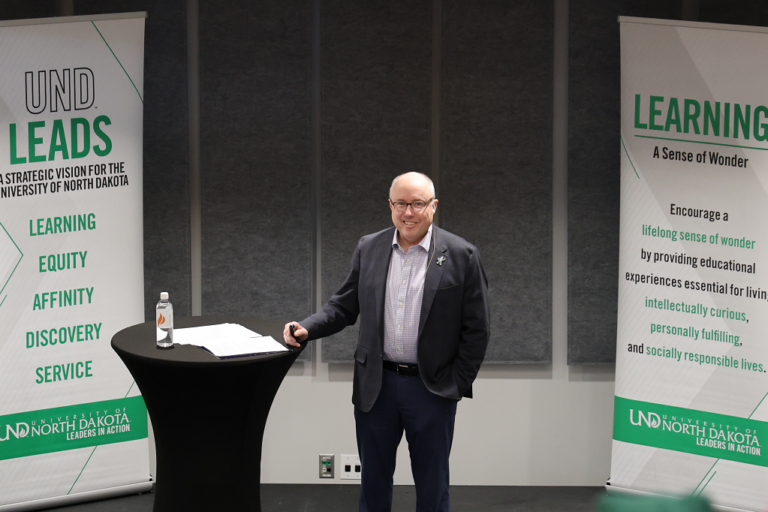The ‘imposters’ among us
UND’s Counseling Center hosts presentation for graduate students on how to face their inner-imposters and perfectionists

Have you ever felt as if you don’t deserve to be where you are in your education or career?
Does that creeping self-doubt make you wonder if you’re capable, if you belong or if you’ll suddenly be discovered to be a fraud by your peers?
If you have, you’re likely not alone, according to the experts at UND. In fact, it’s a completely normal sensation for those entering new jobs, fields of study, degree programs and other transitionary stages of life, said Shellie Beeker, a clinical counselor at UND’s University Counseling Center.

That feeling is most commonly called Imposter Syndrome, Beeker explained to a group of more than 20 graduate students attending a presentation hosted online and in-person, on the third floor of the Gershman Graduate Center on Tuesday.
“Transitioning to Graduate School: Perfectionism & Imposter Syndrome” is a talk Beeker has given to graduate students for the past three years, since she arrived at UND to work as a counselor.
The purpose? To assure students that they are in the right place for the right reasons, that they are not alone, and to let them know there are plenty of campus resources available for those struggling with mental health.
“Going from undergraduate to graduate school is a big jump,” Beeker told UND Today. “And while these students have been admitted to their programs, that doesn’t always make them feel confident that they can do it. It’s really common for students to feel nervous and anxious, and to question themselves.
“What we want to do is help them know that it’s normal, that most people go through this, then give them some tools to maneuver those feelings to make their transition easier.”
‘We’re all imposters, and that’s ok’
When Beeker says “most people,” it’s a statement backed by research. Some 70 percent of people, at some point in their lives, experience imposter thoughts in their workplace, she said.
It’s also been noted that these symptoms of Imposter Syndrome show up across gender, race, age and occupation lines, though the symptoms may be more prevalent among underrepresented or disadvantaged groups. In other words, it’s nearly universal.
One way in which this syndrome may affect graduate students in particular is that such students represent a significantly smaller percentage of the population than students overall, Beeker said. The undergraduate-to-graduate transition also requires considerable independence and self-motivation from students as they pursue degrees based on long-term assignments and research, more than is usually expected in undergraduate studies.
Such factors, along with family, jobs and the like, can make the transition hard for students.
“We want graduate students to remember that they’re here for a reason, and that people do believe in them,” Beeker said. “Another piece is remembering they’re students. In some ways we’re all imposters, and that’s ok.
“If we knew everything already, and were already qualified in our fields and professions, we wouldn’t need graduate school or advanced education.”
One of Beeker’s biggest tips for her audience was to talk about what they’re going through with their friends and peers. Most of the time, she said, people will discover that the statistics don’t lie when it comes to the insecurities most people face. That realization alone – found through speaking up – can be a great help in regulating one’s thoughts, stress and overall feelings toward work.

Mental health: top priority
Through Tuesday’s session and future sessions with the University Counseling Center and Student Diversity & Inclusion, UND’s School of Graduate Studies is making the mental health and wellness of its students a priority this fall and beyond, said Associate Dean Chris Nelson.
After a recent, 22-month study conducted by the Council of Graduate Schools and the Jed Foundation, Nelson said the findings indicated many areas of concern and a need to better attend the mental health and wellness needs of students – not only for the students’ wellbeing, but for their ability to complete degrees and launch careers.

“What we saw is that a decrease in wellness is a major factor in students not completing degrees in a timely fashion and having diminished satisfaction in their education and career outcomes,” Nelson said. “So, in working with the University Counseling Center and other campus units, we want to help students recognize stressors and the impacts those might have. Normalizing these types of conversations can help people work through feelings tied to Imposter Syndrome and other mental health challenges.
“I too have felt Imposter Syndrome at many points in my life, and we want students to recognize that these feelings are normal – through this workshop and others like it on related topics – to help bring appropriate care and attention to the mental health and wellness of our graduate students.”
Ideas put forth by Nelson include establishing peer support groups, convening focus groups among students and working with the Student Diversity & Inclusion office to ensure a nuanced, diverse approach to mental health and wellness challenges.
“Considering the cultural diversity of our students, we know there isn’t a one-size-fits-all solution to destigmatizing these types of conversations,” Nelson added.
In addition to this programming, The School of Graduate Studies is prioritizing guidance and training for both students and faculty on quality mentoring and advising in graduate programs. Such relationships are almost always the defining factor for student success and satisfaction, which are thus closely tied to students’ feelings of wellness, Nelson said.
That was also a point of emphasis in Beeker’s talk, among other pieces of advice for graduate students in regulating their mental health.
“Set up a time to meet with your advisor regularly, and do it in advance before you even need it,” Beeker told her audience. “A lot of times, faculty are looking to you to say what you need, rather than coming to you to say, ‘Would this be helpful?’”
You’re not alone
Beeker went on to offer other tips, such as building new habits of positive self-talk, celebrating successes and resisting comparisons to peers when possible. But ultimately she wanted students to know that help and mental health services are accessible, paid for by their student fees and available in-person or online at the University Counseling Center.
“We’re free and available to all students,” Beeker said. “We have individual counseling, group counseling, workshops, webinars and obviously we do outreach on campus as well.”
More information about the University Counseling Center can be found on their website, or by calling 701.777.2127.



